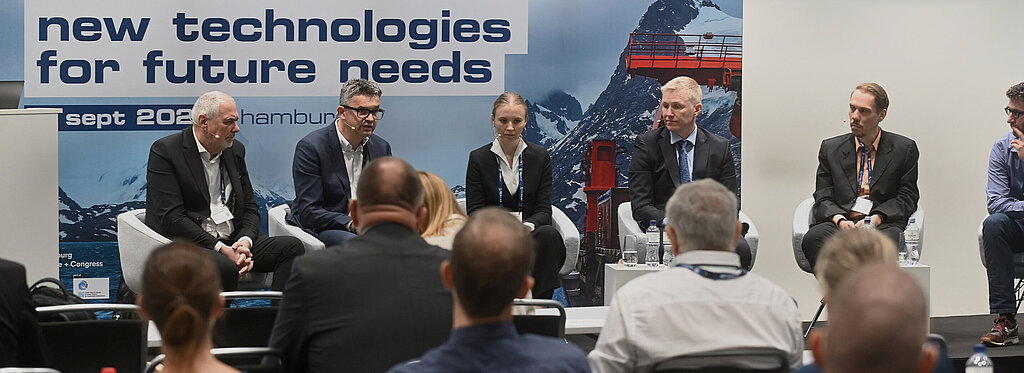Hamburg, 08-09-2022– Before the conference got down to business, Claus-Ulrich Selbach, Business Unit Director Maritime and Technology Fairs at Hamburg Messe und Congress, delivered his welcome address, congratulating the organisers of the Offshore Dialogue on a very special honour: The United Nations have declared this well-established conference, which is regularly held during the maritime flagship fair SMM, an activity of the UN Decade of Ocean Science for Sustainable Development. “The motto of the UN initiative, The Science We Need For The Ocean We Want, is a good fit for the content we will be discussing today,” said Selbach.
For the maritime sector, offshore power generation is key to a successful energy transition. All hopes are pinned on green hydrogen, which is needed for the production of alternative fuels and expected to make a major contribution to the successful decarbonisation of ships. This year’s Offshore Dialogue centred around the questions why offshore power generation is important, what makes it challenging, and what counterarguments might be raised – contentious issues, as the discussion showed. This year again, the international conference took place with the expertly support of GMT, der German Association for Marine Technology. The organisation’s fields of activity range from subsea engineering and marine environment protection to renewable energy and subsea mining.
Session One: Mitigating climate change, potential adaptation strategies and the potential role of offshore technologies
The first of two panel discussions of the Offshore Dialogue focused on defining, based on solid science, where climate change has an impact on the maritime sector today, how the protection of marine environments should be approached, and what changes the shipping industry should consequently make. In his introductory remarks Dr Stefan Knodt from Fraunhofer-IGD in Rostock, Chairman of the Ocean Decade Committee (ODK), highlighted the special importance of the UN Decade of Ocean Science for sustainable development. Apart from global ecological challenges, it addresses topics of great relevance for public opinion and public access to information. Broader knowledge and better understanding will enhance collaboration among the stakeholders, Knodt maintained. German ocean engineering, relying on a well-developed scientific infrastructure, could make a significant contribution to spreading this knowledge. Pursuing a participatory approach was key to this, he said. “Everyone can and should contribute,” the expert advocated.
The importance of interlinking climate data was stressed by Dr Iuliia Polkova from Hamburg University’s Institute for Marine Science (IfM). Aggregating climate data is an essential prerequisite for developing better climate prediction models, she said. This would enable more accurate forecasts of the damage climate change is likely to inflict upon maritime infrastructure in future. Dr Ruediger U. Franz von Bock und Polach explained where global warming is already having a very noticeable impact on the industry. As head of the Institute for Design and Analysis of Ship Structures at Hamburg Technical University, he focuses on the development and enhancement of harmonised standards and guidelines for ice-going ships. Global warming and the resulting shrinking of Arctic ice thickness reduce the ability of the ice cover to resist the mechanical stresses and breaking induced by waves, he explained. This causes waves to become higher and more dangerous, which implies a growing risk of Arctic storms. With Arctic ice appearing to become a merely seasonal phenomenon, Dr Lasse Rabenstein sees an indication of shifting global trade routes. His start-up Drift+Noise has developed a map-based ice information app which outputs useful information for operating in polar regions based upon high-resolution satellite images and other data. This exemplifies the very concrete influence digitalisation can have on future ship operation.
The ensuing discussion showed how digitalisation will be key to successful adaptation strategies amid climate change. IfM scientist Polkova stressed that decision makers need to be given access to research results, and that more practical projects should be initiated. The experts agreed that cooperation between the industry, science and politics should be strengthened at all levels. “We need more rules and guidelines,” said Frode Berntsen, Business Development Manger at the Norwegian classification societyDNV, a statement which received strong applause. Berntsen reported about new technologies designed to help mitigate climate change, such as innovative charging buoys in offshore wind farms where ships can moor to “bunker” green power.
Session Two: Hydrogen, ammonia, methanol and batteries – pathways to carbon-neutral shipping
There are any number of stakeholders interested in using offshore wind power, as the day’s second panel discussion revealed. For example, coupling wind turbines directly with electrolysers could minimise the cost of hydrogen production. The concept is based on the realisation that transporting hydrogen to the shore using pipelines is much cheaper than transmitting electricity through electric cables. The green hydrogen generated at sea would pave the way to carbon neutrality. A clear proponent of this form of hydrogen production on the panel was Dr Bernadette Zipfel who is in charge of next-generation technologies at RWE Renewables. Operating offshore wind turbines with a combined capacity of 2.4 gigawatts (GW), the energy giant is currently one of the world market leaders in this segment. Her company’s growth targets are ambitious, Zipfel stressed, aiming to triple its offshore capacity to eight GW by the year 2030. A goal that can only be realised if the maritime industry is willing to cooperate, she said: “To design the hydrogen bunkering interface we need cross-sectional know-how.”
It was quite refreshing how Dr Martin Kaltschmitt, professor at Hamburg Technical University where he heads the Institute for Environmental Technology and Energy Economy, picked up the thread. Instead of delivering an introduction and theoretical explanations, he indirectly countered his predecessor’s remarks with what he called a historical quote: “Growth is not unlimited.” Maritime resources must be used more sustainably and efficiently, he proposed. This not only requires technical solutions but also better integration of systems. As an example the scientist referred to multiple use of biomass. Sönke Diesener, representing the German environmental NGO NABU, brought the discussion around to green ammonia as an alternative fuel. He strongly opposed the continued use of LNG and expanding onshore wind power. Different opinions about the benefits and disadvantages of ammonia, especially when compared with hydrogen which is even more difficult to contain in tanks and pipelines than natural gas while being even more flammable, led to a heated discussion among the SMM experts who also brought up methanol as a ship fuel. Methanol represents a direct and promising solution, offering practical advantages in terms of storage, handling and CO2 intensity reduction, said Georgios Plevrakis, Vice President of Global Sustainability at the US classification societyABS. The panelists agreed that it was impossible to predict which of the fuels will win the race. Consultant Dr Walter Kuehnlein, founder of the start-up terra.blue, who moderated the Offshore Dialogue jointly with the Director of the newly-established Institute for Maritime Energy systems, Professor Dr Sören Ehlers, had a clear message: Everything will be needed. In his view, this specifically includes batteries, which are much more efficient than hydrogen and alternative fuels. However, there are challenges associated with energy storage. It remains to be seen how the ideas, assessments and forecasts heard during this year’s Offshore Dialogue will evolve. The next SMM in 2024 may draw a clearer picture.


